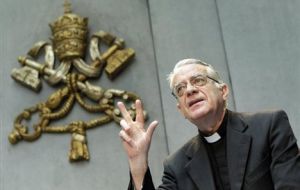MercoPress. South Atlantic News Agency
Vatican says it is complying with anti money laundering recommendations
 Spokesman Rev. Federico Lombardi explains the Vatican’s position
Spokesman Rev. Federico Lombardi explains the Vatican’s position The Vatican on Friday sought to explain its presence for the first time on a US list of countries that are a potential hub for money laundering, saying it was only natural to be included given its recent efforts to conform to international standards.
The US State Department this week released its International Narcotics Control Strategy Report, which identified the Holy See as one of 68 countries or jurisdictions “of concern” for money laundering or other financial crimes.
Vatican spokesman the Rev. Federico Lombardi noted Friday that all the world's major economies — the US, Japan and even Italy — are identified as countries of “primary concern” for money laundering. That more serious designation is because of the sheer size of their economies.
Lombardi said it wasn't surprising that the Vatican was placed on the list of jurisdictions “of concern” since it joined a European evaluation process in 2011 to try to conform to international anti-money laundering standards.
In early July, the Vatican is expected to learn whether it has complied with a host of recommendations to fight terror financing and money laundering.
The State Department report didn't explain why the Holy See was included noting only that it was on the list for the first time. South Sudan, which declared its independence in 2011, was also included for the first time in another category of countries being monitored.
The Vatican passed legislation in 2010 making money laundering a crime and fine-tuned the law earlier this year. It also ratified three major U.N. conventions.
The moves are all part of the Holy See efforts to get on the “white list” of countries that share financial information and shed its long-held reputation as a secretive offshore tax haven whose bank has been embroiled in scandals over the years
The 2012 International Narcotics Control Strategy Report was made public on Wednesday and Washington's list of 190 countries classifies them in three categories: of primary concern, of concern and monitored.
The Vatican is in the second category, grouped with 67 other nations including Poland, Egypt, Ireland, Hungary and Chile. It was added to the list because it was considered vulnerable to money-laundering and had recently established programmes to prevent it, a State Department official said.
“To be considered a jurisdiction of concern merely indicates that there is a vulnerability to a financial system by money launderers. With the large volumes of international currency that goes through the Holy See, it is a system that makes it vulnerable as a potential money-laundering centre” said Susan Pittman of the State Department's Bureau of International Narcotics and Law Enforcement.
The category of most vulnerable centres includes all members of the Group of Eight countries, including the United States, Germany, Italy and Russia, because the size of their economies and banking systems can facilitate money-laundering. It also includes small centres such as Britain's Channel Islands.
The State Department's methodology is different from that of the Financial Action Task Force's International Cooperation Review Group (ICRG), which concentrates on a nation's compliance with international law and money-laundering regulations.
The Vatican Bank, founded in 1942 by Pope Pius XII, has been in the spotlight since September 2010 when Italian investigators froze 23 million Euros in funds in Italian banks after opening an investigation into possible money-laundering.
The bank said it did nothing wrong and was just transferring funds between its own accounts. The money was released in June 2011 but the investigation is continuing.
The Vatican's new financial transparency laws set up internal regulations to make sure its bank and all other departments adhere to international regulations and standards, and cooperate with foreign authorities.
Two months ago, Italian newspapers published leaked internal letters which appeared to show a conflict among top Vatican officials about just how transparent the bank should be about dealings that took place before it enacted its new laws.
The Vatican Bank was formally known as the Institute for Works of Religion (IOR) and was entangled in the collapse 30 years ago of Banco Ambrosiano, with its lurid allegations about money-laundering, freemasons, Mafiosi and the mysterious death of Ambrosiano chairman Roberto Calvi, “God's banker” still unsolved.




Top Comments
Disclaimer & comment rules-

-

-

Read all commentsRev. Federico Lombardi: “We only let Catholics like Tony Blair pay for indulgences in used bank notes, of several denominations and the ODESSA rat lines money is fully audited.”
Mar 10th, 2012 - 08:34 am 0We believe every word they say. Don't we?!
Mar 10th, 2012 - 08:14 pm 0mmmm, corrupt Christians??
Mar 12th, 2012 - 12:13 pm 0I'm not going to say “I told you so” but I told you so
God will take care of you, we will take care of your wallet
Commenting for this story is now closed.
If you have a Facebook account, become a fan and comment on our Facebook Page!